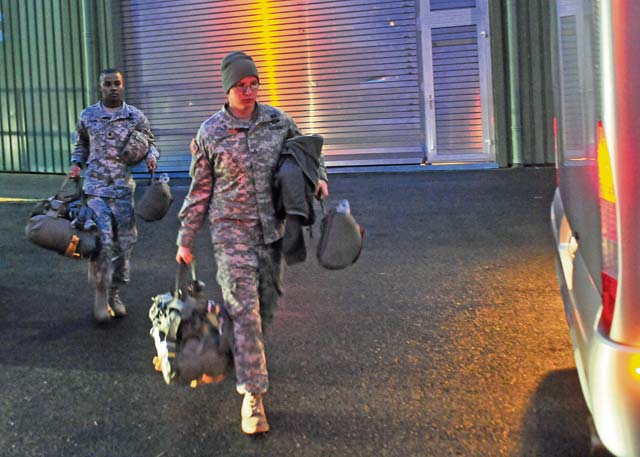
Their morning starts early with each of them reporting to the shed at 6 a.m. They begin with safety training, practice, drawing gear and inspections before getting on a bus. Rain or shine, high winds or calm, whether they jump or not, these paratroopers are always prepared.
Soldiers from the 21st Theater Sustainment Command’s 5th Quartermaster Detachment, part of the 21st Special Troops Battalion, prepared for a proficiency static line and Army free-fall jump Nov. 7 in the KMC.
All Soldiers involved in the jump reported to the 5th QM Det. rigger shed early for sustained airborne training. Jumpmasters reviewed procedures for operating inside the aircraft, exiting the aircraft, landing on the ground, landing in water and emergency procedures. Each Soldier also performed practice landings, said Chief Warrant Officer 2 Orlando Velez, the 5th QM Det. liaison officer to the 21st TSC.
“Today’s jump is a jump for proficiency to ensure these Soldiers maintain their capabilities,” Velez said. “No matter what kind of jump we are doing, we go through sustained airborne training every time to keep everybody safe.”
All jumping Soldiers then received their parachutes and boarded a bus for Ramstein. Behind the scenes, Staff Sgt. Ian Dimmick, a platoon sergeant with the 5th QM Det., conducted wind calculations at various elevations to ensure the safety of both static line and free-fall paratroopers.
“Safety is incredibly important in all aspects of the Army, but especially when conducting airborne operations,” Dimmick said. “Knowing the wind speeds at various altitudes determines when and where our jumpers will exit the aircraft. If the wind is blowing too hard, it can also cause us to cancel the jump.”
The buses carrying the 5th QM Det. paratroopers arrive at the flightline with each Soldier prepared for the jump. They donned their parachutes and checked each other’s equipment 30 minutes before boarding the plane.
Paratroopers conduct regular jumps to refine and reinforce skills, validate training and maintain their combat edge. Each mission blends doctrinal standards, tactics, techniques and procedures with new applications and new circumstances. Some missions end in “stand downs” due to inclement weather or unforeseen developments, while others culminate in highly successful jumps. All missions, however, yield valuable insights, valuable training, experience and lessons learned. All result in better prepared paratroopers and support Soldiers.
Each Soldier from the 5th QM Det. conducted all drills and prepared for the jump correctly. However, inclement weather forced the jumpmaster to cancel the airborne operation.
“We prepared and did all the training necessary, and all of these Soldiers did everything right,” Dimmick said. “Because of the
weather conditions and safety considerations, we had to cancel this jump, but we are always ready to jump again.”


